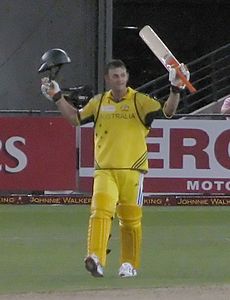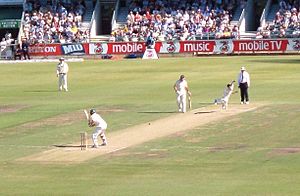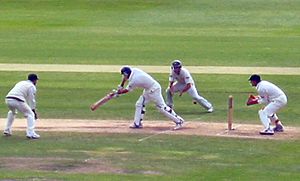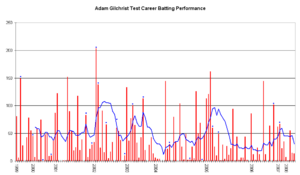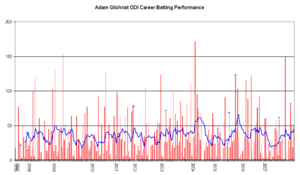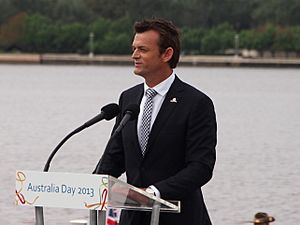Adam Gilchrist facts for kids

Gilchrist in 2010
|
||||||||||||||||||||||||||||||||||||
| Personal information | ||||||||||||||||||||||||||||||||||||
|---|---|---|---|---|---|---|---|---|---|---|---|---|---|---|---|---|---|---|---|---|---|---|---|---|---|---|---|---|---|---|---|---|---|---|---|---|
| Full name |
Adam Craig Gilchrist
|
|||||||||||||||||||||||||||||||||||
| Born | 14 November 1971 Bellingen, New South Wales, Australia |
|||||||||||||||||||||||||||||||||||
| Nickname | Gilly, Churchy | |||||||||||||||||||||||||||||||||||
| Height | 186 cm (6 ft 1 in) | |||||||||||||||||||||||||||||||||||
| Batting | Left-handed | |||||||||||||||||||||||||||||||||||
| Role | Wicket-keeper-batsman | |||||||||||||||||||||||||||||||||||
| International information | ||||||||||||||||||||||||||||||||||||
| National side |
|
|||||||||||||||||||||||||||||||||||
| Test debut (cap 381) | 5 November 1999 v Pakistan | |||||||||||||||||||||||||||||||||||
| Last Test | 24 January 2008 v India | |||||||||||||||||||||||||||||||||||
| ODI debut (cap 129) | 25 October 1996 v South Africa | |||||||||||||||||||||||||||||||||||
| Last ODI | 4 March 2008 v India | |||||||||||||||||||||||||||||||||||
| ODI shirt no. | 12, 18 | |||||||||||||||||||||||||||||||||||
| T20I debut (cap 2) | 17 February 2005 v New Zealand | |||||||||||||||||||||||||||||||||||
| Last T20I | 1 February 2008 v India | |||||||||||||||||||||||||||||||||||
| Domestic team information | ||||||||||||||||||||||||||||||||||||
| Years | Team | |||||||||||||||||||||||||||||||||||
| 1992/93–1993/94 | New South Wales | |||||||||||||||||||||||||||||||||||
| 1994/95–2007/08 | Western Australia | |||||||||||||||||||||||||||||||||||
| 2008–2010 | Deccan Chargers | |||||||||||||||||||||||||||||||||||
| 2010 | Middlesex | |||||||||||||||||||||||||||||||||||
| 2011–2013 | Kings XI Punjab | |||||||||||||||||||||||||||||||||||
| Career statistics | ||||||||||||||||||||||||||||||||||||
|
||||||||||||||||||||||||||||||||||||
|
Medal record
|
||||||||||||||||||||||||||||||||||||
|
Source: ESPNcricinfo, 4 December 2013
|
||||||||||||||||||||||||||||||||||||
Adam Craig Gilchrist (born 14 November 1971) is a famous Australian cricket commentator and former international player. He was also a captain for the Australia national cricket team. Gilchrist was a left-handed batsman who hit the ball very hard and a record-breaking wicket-keeper. He changed how the wicket-keeper role was played for Australia with his strong batting.
Many people think he is the best wicket-keeper-batsman ever. Gilchrist held the world record for the most dismissals by a wicket-keeper in One Day International (ODI) cricket for a long time. He also held the record for most dismissals by an Australian in Test cricket. Gilchrist was a key player in the Australian team that won three World Cup titles in a row: in 1999, 2003, and 2007. He also helped win the 2006 ICC Champions Trophy.
Gilchrist was known for hitting the ball very fast. His 57-ball century against England in 2006 was one of the fastest centuries in Test cricket history. He was the first player to hit 100 sixes in Test matches. He also holds a special record for scoring at least 50 runs in three World Cup finals (1999, 2003, and 2007). His score of 149 runs from 101 balls in the 2007 World Cup final is considered one of the best World Cup innings ever. He is one of only three players to win three World Cup titles.
Gilchrist was famous for "walking" off the field when he thought he was out, even if the umpire did not agree. He started playing first-class matches in 1992. His first One-Day International game was in 1996, and his Test debut was in 1999. During his career, he played 96 Test matches and over 270 One-Day Internationals for Australia. He was often the vice-captain and led the team when regular captains like Steve Waugh and Ricky Ponting were not available. He stopped playing international cricket in March 2008 but continued in domestic games until 2013.
Contents
Early Life and Family
Adam Gilchrist was born in 1971 in Bellingen, New South Wales. He was the youngest of four children. His family lived in different towns like Dorrigo, Junee, and Deniliquin. In Deniliquin, he played for his school team and won a special award. When Adam was 13, his family moved to Lismore, where he became the captain of his high school cricket team.
Gilchrist was chosen for the state's under-17 team. In 1989, he received a scholarship to play for Richmond Cricket Club in London. He now helps other young players with similar scholarships. After his time in London, he moved to Sydney and joined the Gordon District Cricket Club.
Gilchrist is married to Melinda Sharpe, his high school sweetheart. She is a dietitian. They have three sons and one daughter. His family was in the news before the 2007 Cricket World Cup because his child was due to be born. Luckily, the baby was born in February, so Gilchrist could play in the tournament.
Playing for Teams in Australia and India
In 1991, Gilchrist was selected for the Australia Young Cricketers team. This national youth team toured England. Gilchrist played well, scoring a century and a fifty in three youth Test matches. When he returned to Australia, he joined the Australian Cricket Academy.
The next year, Gilchrist played for the ACA against state teams. He also toured South Africa to play against youth teams there. After coming back to Australia, Gilchrist scored two centuries for his state's junior teams. This led to him making his first-class debut for New South Wales in the 1992–93 season. He played as a batsman because another player was the main wicket-keeper.
His team, New South Wales, won the Sheffield Shield in his first season. Gilchrist scored 20 runs not out in the final game. He made 274 runs that season. However, he found it hard to keep his spot in the team. He played only three first-class matches the next season.
Because he did not get many chances in New South Wales, Gilchrist moved to Western Australia in 1994–95. He had to compete for the wicket-keeper spot there. Gilchrist scored a century in a practice match and earned his place. He made 55 dismissals in his first season, the most by any wicket-keeper in Australia that year. He also scored his first first-class century, 126 runs, against South Australia.
In his second season in Perth, he again led in dismissals with 58 catches and four stumpings. He also scored 835 runs at a great average of 50.52. The Warriors reached the final of the Sheffield Shield. Gilchrist scored 189 runs not out in the first innings, hitting five sixes. This made him well-known across Australia.
Gilchrist's strong play led to him being chosen for Australia A. This team included players who were close to joining the national team. By the start of the 1996–97 season, some people in the media thought he should replace Ian Healy as Australia's wicket-keeper. But Healy played well and kept his spot. Gilchrist continued to perform strongly in domestic games.
His team, the Warriors, won the Mercantile Mutual Cup in March 1997. Gilchrist was not needed to bat in the final. In the 1997–98 season, Gilchrist was again the top wicket-keeper. He also had a good batting average of 47.66. He scored his first double century, 203 not out, against South Australia. He also played in the Sheffield Shield final, which Western Australia won.
After he became the main Test wicket-keeper in late 1999, Gilchrist played less for his state team. Between 1999 and 2005, he only played seven first-class matches for Western Australia.
Indian Premier League (IPL)
Gilchrist played for six seasons in the Indian Premier League (IPL), which is a big Twenty20 cricket league in India. He played three seasons for Deccan Chargers and three for Kings XI Punjab. He joined Deccan Chargers in 2008, the first year of the IPL.
Before the 2011 IPL season, Kings XI Punjab bought Gilchrist. He was made captain again. In 2012, he became the player-coach for the team. After the team did not make the play-offs, Gilchrist thought about retiring from cricket.
He decided to play one more IPL season for Kings XI in 2013, again as captain. In May 2013, Gilchrist announced he was retiring from the IPL. He had planned to play in the Caribbean Premier League, but an ankle injury stopped him. His last top-class cricket match was when he took a wicket with the only ball he ever bowled in a T20 match.
Gilchrist played 82 IPL matches in total. He scored over 2,000 runs, including two centuries. He was also the first player to score 1,000 runs in the IPL.
Playing for Middlesex
In 2009, Gilchrist signed a short contract to play Twenty20 cricket for Middlesex County Cricket Club in England during 2010. He became the temporary captain of the T20 team. He played seven matches for them, scoring 212 runs. This included a century against Kent. He also captained Middlesex against the touring Australian team in a one-day match. This was Gilchrist's only season playing county cricket.
International Cricket Career
| Adam Gilchrist's record as captain | |||||||||
|---|---|---|---|---|---|---|---|---|---|
| Matches | Won | Lost | Drawn | Tied | No result | Win % | |||
| Test | 6 | 4 | 1 | 1 | 0 | – | 66.67% | ||
| ODI | 17 | 12 | 4 | 0 | 0 | 1 | 70.59% | ||
| Twenty20 | 2 | 1 | 1 | 0 | 0 | – | 50% | ||
| Date last Updated: | 2 September 2015 | ||||||||
Early One-Day Matches
Gilchrist joined the Australian One Day International (ODI) team in 1996. His first game was against South Africa on 25 October 1996. He got this chance because the main wicket-keeper, Ian Healy, was injured. Gilchrist did not score many runs in his first game, but he took his first international catch.
Healy returned to the team later, but Gilchrist got another chance when Healy was suspended. Gilchrist then stayed in the team as a specialist batsman after Mark Waugh got a hand injury. During this series, Gilchrist scored his first ODI half-century, 77 runs.
In 1997–98, Gilchrist became a regular player in the ODI team. The selectors decided to pick separate teams for ODIs and Tests. Gilchrist started opening the batting with Mark Waugh. In the second final against South Africa, Gilchrist scored his first ODI century. This helped Australia win the game and the series.
Gilchrist played very well in New Zealand in February 1998, scoring 200 runs. He also made his first ODI stumping. Australia then played in two tournaments in Asia. Gilchrist struggled in India but played better in Sharjah.
Gilchrist won a silver medal at the 1998 Commonwealth Games in Kuala Lumpur. This was the only time men's cricket was in the Commonwealth Games. He then scored 103 runs as Australia won 3–0 in Pakistan.
Before the 1999 Cricket World Cup, Gilchrist was in great form. He scored 525 runs in a series against Sri Lanka and England, including two centuries. He also made 27 dismissals.
First World Cup Win
Gilchrist played in every match of Australia's successful 1999 World Cup campaign. He struggled at first, but his quick 63 runs against Bangladesh helped Australia reach the next stage. He continued to struggle with his batting in the later stages.
In the semi-final against South Africa, Gilchrist scored 20 runs. The game ended in a tie, but Australia went to the final because they had won their earlier group match against South Africa. In the final, Gilchrist scored 54 runs. This helped Australia win their first World Cup title since 1987, beating Pakistan.
After the World Cup, Gilchrist was the best batsman and wicket-keeper in the Aiwa Cup tournament. He also helped Australia win 3–0 against Zimbabwe.
Test Match Debut
Gilchrist made his Test match debut in November 1999 against Pakistan in Brisbane. He replaced Healy, who was dropped. Gilchrist's arrival in Test cricket came as Australia's team started to win a lot more.
In his first Test, he took five catches and scored a fast 81 runs. Australia won easily. In his second Test, he scored 149 runs not out. This helped Australia win a game that seemed very difficult. Gilchrist continued to play well in his first Test season, scoring 485 runs in six matches.
He also played well in the ODI series that followed. Australia beat Pakistan 2–0. Gilchrist scored 272 runs. He then scored 251 runs in ODIs during a tour of New Zealand, including 128 runs in Christchurch.
In the Third Test against New Zealand in 2000, Gilchrist took ten catches in the match. This was the best performance by an Australian wicket-keeper in a Test. Australia won the series 3–0. Later that year, he became the vice-captain of the Australian team.
The 2000–01 season saw the West Indies tour Australia. Gilchrist scored two centuries for Western Australia before the Tests. He captained the Test team for the first time in the Third Test in Adelaide because Steve Waugh was injured. Australia won a tough game. Gilchrist scored 241 runs in the series. In the ODI tournament, Gilchrist scored 326 runs as Australia won all ten matches.
Australia had won 15 Test matches in a row. This record was challenged on their tour of India in 2001. Australia had not won a Test series there since 1969–70. In the First Test in Mumbai, Gilchrist scored 122 runs very quickly. This helped Australia win by ten wickets and extend their world record to 16 wins.
Gilchrist's form dropped for a short time after that. He got out for zero runs twice in the Second Test and scored only two runs in Chennai. Australia lost the series 2–1. However, his one-day form stayed strong. He scored 172 runs in the ODI series in India, which Australia won 3–2. He also captained the ODI team for the first time in this series, winning all three matches.
2001 Ashes Series
Gilchrist played a very important part in the 2001 Ashes series against England. Australia won the series 4–1. Gilchrist scored 340 runs and made 26 dismissals.
In the First Test, Gilchrist scored 152 runs from only 143 balls. This helped Australia win easily. He then scored 90 runs in the Second Test. In the Third Test, Australia was in trouble, but Gilchrist's 54 runs helped them recover and win.
Gilchrist captained the team in the Fourth Test after Steve Waugh was injured. Australia lost this match. Gilchrist did not score many runs in the last two Tests, but it was still a very good series for him.
Two home series followed in 2001–02. Australia drew 0–0 against New Zealand and won 3–0 against South Africa. Gilchrist scored 118 runs against New Zealand and 83 not out in Perth. However, he did not score much against South Africa.
In the ODIs that followed, Gilchrist scored only 97 runs. The Australian selectors tried to fit Matthew Hayden into the ODI team, which seemed to upset the team. Australia did not make it to the finals. Ricky Ponting became the captain instead of Gilchrist.
The Australians then toured South Africa. In the First Test in Johannesburg, Gilchrist broke the record for the fastest double century in Tests on 23 February 2002. He scored 204 runs not out. This record lasted only one month. Gilchrist scored 138 runs in the Second Test and 91 runs in the Third Test. He ended the series with an amazing 473 runs.
Gilchrist captained the ODI team again for one match against Kenya. Australia won all their matches in the tournament, but the final was rained out. Gilchrist played well in ODIs during 2002, scoring 562 runs.
After scoring 122 runs in a 3–0 Test series win over Pakistan, Gilchrist helped Australia win The Ashes 4–1 in 2002–03. He scored 330 runs and made 25 dismissals. He scored 133 runs in the Fifth Test.
By 2003, Gilchrist was seen as one of the best batsman-wicketkeepers ever. His Test batting average was very high. He also won the Allan Border Medal in 2003, which is a top award in Australian cricket.
2003 World Cup Win
Gilchrist played in almost all matches in Australia's successful defense of their World Cup title in 2003. He scored 408 runs in the tournament. He scored four half-centuries. In the semi-final, he was given not out by the umpire, but he decided to "walk" off the field because he thought he was out. This action was praised by many.
In the final against Sri Lanka, Gilchrist hit 57 runs very quickly. This helped Australia get a great start and win by 125 runs, finishing an unbeaten tournament. Gilchrist was also the best wicket-keeper in the competition, making 21 dismissals.
After the World Cup, Australia toured the West Indies and won both the ODI and Test series. Gilchrist scored 282 runs in the Tests and 212 runs in the ODIs.
Later Career and Retirement
Gilchrist's Test form dipped after 2003, but he returned to form in the Second Test in Kandy, scoring 144 runs. He continued to play well in ODIs, including 111 runs against India and 172 runs against Zimbabwe. He became the top-ranked ODI batsman in February 2004.
Gilchrist captained the Test team again in 2004 when Ponting was injured. He led Australia to a historic 2–1 series victory in India, which had not happened since 1969.
He returned to strong form in 2005 against New Zealand and Pakistan, scoring several centuries. He also played well in ODIs in England. However, he did not perform well in the 2005 Ashes series, which Australia lost 2–1.
Gilchrist and Australia returned to form after the Ashes. Gilchrist scored 103 runs against the ICC World XI. In 2005–06, he struggled with the bat in Tests against the West Indies and South Africa.
His one-day form also suffered for a while. But he returned to form in January 2006, hitting 116 runs against Sri Lanka. He then scored the fastest century by an Australian in just 67 balls against Sri Lanka.
On 16 December 2006, during the Third Ashes Test, Gilchrist scored a century in 57 balls. This was the second fastest Test century ever at the time. He ended the 2006–07 Ashes with a century and two fifties as Australia won 5–0.
Gilchrist had a surprising string of poor results in the 2006–07 Commonwealth Bank Series. He was then rested for a tour of New Zealand before the 2007 Cricket World Cup.
2007 World Cup Win
Gilchrist and Australia started their 2007 World Cup campaign by winning all their group matches. Australia won all their Super8 matches easily. Gilchrist opened the batting in each match. He scored half-centuries against Scotland, the Netherlands, South Africa, and Bangladesh.
In the semi-final against South Africa, Gilchrist was dismissed for one run, but Australia still won. In the final against Sri Lanka, Gilchrist played in his third straight World Cup final. He scored 149 runs off 104 balls, hitting thirteen fours and eight sixes. This was the highest individual score in a World Cup final. Australia won, and he was named the man of the match. There was some discussion later about him using a squash ball inside his glove during this innings, but it was confirmed that he did not break any rules.
In September 2007, Gilchrist played in the first World Twenty20. He scored 169 runs as Australia lost in the semi-finals. In November, Gilchrist's fellow players voted him the greatest Australian ODI cricketer ever. He was only needed to bat once in the Tests against Sri Lanka, scoring 67 not out as Australia won 2–0.
Retirement from International Cricket
On 26 January 2008, during the final Test against India, Gilchrist announced he would retire from international cricket. He captained the team for part of his last Test match because Ricky Ponting was injured. India batted out the match for a draw, so Gilchrist's 14 runs in the first innings was his final Test innings. He took his 379th and final catch.
Many people, including Australian Prime Minister Kevin Rudd, asked Gilchrist to reconsider his retirement. Gilchrist later said he decided to retire after dropping a catch, realizing he had lost his "competitive edge." He played out the summer's ODI series. His highlight was scoring 118 runs in his final match in Perth on 15 February 2008. He ended his final series with 322 runs.
Playing Style and Records
Gilchrist's attacking batting was very important to Australia's success in one-day cricket. He usually opened the batting. His Test batting average was very high for a wicket-keeper. When he retired, he had one of the highest strike-rates in Test history, meaning he scored runs very quickly. He was second on the all-time list for most sixes in Tests with 100.
Some people questioned Gilchrist's wicket-keeping skills, but he was very good at catching for fast bowlers like Glenn McGrath and Brett Lee. He shares the record for most catches (6) by a wicket-keeper in an ODI match, doing this five times. In 2005, he broke Alec Stewart's world record for most runs as a Test wicketkeeper. When he retired in 2008, he was the most successful ODI wicket-keeper with 472 dismissals. This record was later broken by Kumar Sangakkara.
Walking Off the Field
It is unusual for professional batsmen to "walk" off the field without waiting for the umpire's decision. Gilchrist brought this topic back into discussion when he walked during the 2003 World Cup semi-final, even though the umpire had ruled him not out. He said he was a "walker" and would always leave if he thought he was out.
Gilchrist said in his autobiography that his teammates did not support his decision to walk. He felt "isolated" and thought they believed he was being "selfish" or trying to look good.
Achievements and Awards
Awards and Honors
Gilchrist was named one of the five Wisden Cricketers of the Year in 2002. He was also Australia's One-day International Player of the Year in 2003 and 2004. He won the Allan Border Medal in 2003. In 2004, he was the only active player named in "Richie Benaud's Greatest XI."
He was chosen for the ICC World XI team. International bowlers voted him the "World's Scariest Batsman." He was also named as wicket-keeper and opening batsman in Australia's "greatest ever ODI team." In a poll by ESPNcricinfo in 2007, he was voted the ninth greatest all-rounder of the last one hundred years.
In 2010, Gilchrist was made a Member of the Order of Australia (AM) for his contributions to cricket and the community. He was inducted into the Sport Australia Hall of Fame in 2012. On 9 December 2013, the ICC inducted Gilchrist into the prestigious ICC Hall of Fame. In 2021, he was named an Australia Post Legend of Cricket.
Test Match Performance Summary
| Batting | Fielding | ||||||
|---|---|---|---|---|---|---|---|
| Opponent | Matches | Runs | Average | High score | 100s / 50s | Catches | Stumpings |
| Bangladesh | 4 | 199 | 66.33 | 144 | 1 / 0 | 14 | 1 |
| England | 20 | 1,111 | 46.29 | 152* | 3 / 7 | 89 | 7 |
| ICC World XI | 1 | 95 | 47.50 | 94 | 0 / 1 | 5 | 2 |
| India | 14 | 659 | 27.89 | 122 | 2 / 2 | 48 | 2 |
| New Zealand | 11 | 923 | 76.91 | 162 | 4 / 5 | 38 | 3 |
| Pakistan | 9 | 616 | 68.44 | 149* | 2 / 3 | 34 | 4 |
| South Africa | 12 | 754 | 47.12 | 204* | 2 / 2 | 39 | 5 |
| Sri Lanka | 7 | 383 | 42.55 | 144 | 1 / 2 | 32 | 5 |
| West Indies | 12 | 575 | 47.91 | 101* | 1 / 4 | 46 | 6 |
| Zimbabwe | 1 | 133 | 133.00 | 133* | 1 / 0 | 9 | 2 |
| Overall | 92 | 5,448 | 47.60 | 204* | 17 / 25 | 354 | 37 |
ODI Highlights Summary
| Batting | Fielding | ||||||
|---|---|---|---|---|---|---|---|
| Opponent | Matches | Runs | Average | High score | 100s / 50s | Catches | Stumpings |
| Asia XI | 1 | 24 | 24.00 | 24 | 0 / 0 | 1 | 1 |
| Bangladesh | 12 | 444 | 55.50 | 76 | 0 / 5 | 23 | 4 |
| England | 35 | 1087 | 32.94 | 124 | 2 / 6 | 60 | 4 |
| ICC World XI | 3 | 180 | 60.00 | 103 | 1 / 0 | 2 | 0 |
| India | 40 | 1568 | 41.26 | 111 | 1 / 12 | 63 | 4 |
| Ireland | 1 | 34 | 34.00 | 34 | 0 / 0 | 0 | 0 |
| Kenya | 3 | 130 | 43.33 | 67 | 0 / 1 | 4 | 1 |
| Namibia | 1 | 13 | 13.00 | 13 | 0 / 0 | 6 | 0 |
| Netherlands | 1 | 57 | 57.00 | 57 | 0 / 1 | 0 | 1 |
| New Zealand | 41 | 1195 | 31.45 | 128 | 2 / 7 | 55 | 6 |
| Pakistan | 24 | 761 | 33.08 | 103 | 1 / 5 | 39 | 5 |
| Scotland | 2 | 52 | 26.00 | 46 | 0 / 0 | 3 | 1 |
| South Africa | 44 | 1127 | 28.18 | 105 | 2 / 6 | 60 | 9 |
| Sri Lanka | 27 | 1243 | 45.76 | 154 | 5 / 2 | 27 | 6 |
| United States | 1 | 24 | – | 24* | 0 / 0 | 2 | 0 |
| West Indies | 25 | 735 | 30.63 | 98 | 0 / 5 | 33 | 4 |
| Zimbabwe | 15 | 572 | 38.13 | 172 | 1 / 2 | 20 | 6 |
| Overall | 268 | 9038 | 38.69 | 172 | 15 / 50 | 386 | 50 |
Best Performances
| Batting | ||||
|---|---|---|---|---|
| Score | Fixture | Venue | Season | |
| Test | 204* | South Africa v Australia | Wanderers Stadium, Johannesburg | 2003 |
| ODI | 172 | Australia v Zimbabwe | Bellerive Oval, Hobart | 2004 |
| T20I | 48 | Australia v England | SCG, Sydney | 2007 |
| FC | 204* | South Africa v Australia | Wanderers Stadium, Johannesburg | 2003 |
| LA | 172 | Australia v Zimbabwe | Bellerive Oval, Hobart | 2004 |
| T20 | 109* | Mumbai Indians v Deccan Chargers | DY Patil Stadium, Mumbai | 2008 |
Life After Cricket
After retiring from cricket, Gilchrist became an ambassador for the charity World Vision in India. He is very popular there because of his cricket achievements. He also supports a program that helps children whose fathers have passed away.
In March 2008, Gilchrist joined the Nine Network as a cricket commentator. He has appeared on the "Wide World of Sports Weekend Edition" and commentates on Fox Sport's cricket coverage. In 2013, he joined other famous cricketers to commentate for Channel Ten in the Big Bash League.
Gilchrist has also been involved in charity events as an ambassador for Amway Australia. In 2010, he presented a cheque for $20,000 to the Freedom Wheels program, which provides special bikes for kids with disabilities.
From 2008 to 2014, Gilchrist was the chair of the National Australia Day Council. He supported discussions about whether Australia Day should be moved to a different date. This is because the current date marks British settlement, which some Aboriginal Australians find offensive.
Gilchrist has also held positions on company boards outside of cricket. He was a director for TFS Corporation and a committee member of the Commonwealth Business Forum.
See also
 In Spanish: Adam Gilchrist para niños
In Spanish: Adam Gilchrist para niños
 | Kyle Baker |
 | Joseph Yoakum |
 | Laura Wheeler Waring |
 | Henry Ossawa Tanner |


